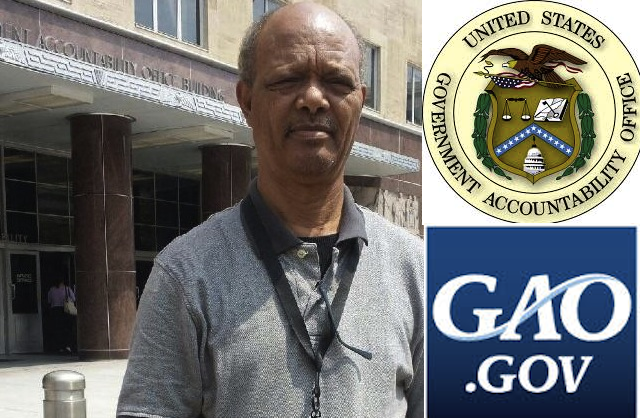 Dr. Gezahegne Bekele, Senior International Economist at the U.S. Accountability Office. (Courtesy photo)
Dr. Gezahegne Bekele, Senior International Economist at the U.S. Accountability Office. (Courtesy photo)
Tadias Magazine
By Tadias Staff
Published: Tuesday, August 12th, 2014
New York (TADIAS) – In 2015, the African Growth and Opportunity Act (AGOA) — which was signed into law in 2000 and is a trade program allowing eligible Sub-Saharan African countries to export goods to the United States duty free — will be up for review and renewal. Tadias recently interviewed Dr. Gezahegne Bekele, Senior International Economist at the United States Government Accountability Office who has worked extensively on AGOA.
Dr. Gezahegne joined the US Government Accountability Office in 1989 after having taught for over two decades at several institutions including the University of Miami, University of Oklahoma and Florida International University. He has authored papers focusing on food security, and today he is an international trade specialist who has worked on issues including the cost of remittances. Dr. Gezahegne has provided economic research reports to US Congress and Senate. In addition to his expertise on AGOA, his economic development work has enabled him to travel to numerous countries in Asia, Africa, and the former Soviet Union.
“To promote free markets, stimulate economic growth, and to facilitate Sub-Saharan integration into the world economy, US Congress signed AGOA into law on May 18th, 2000,” says Dr. Gezahegne. AGOA allows approximately 5,200 types of goods to be duty-free. Although crude petroleum is the largest import from AGOA countries, other items include automobile parts, steel, and cut-flowers.
In 2004 US Congress further amended AGOA to allow certain eligible countries to use fabric for garment production sourced from foreign nations. Through this amendment, Dr. Gezahegne notes that “If Ethiopia produces textiles made out of its own cotton and yarn, or imported from other foreign countries, it can still export the final product duty-free to the United States.” In the case of Ethiopia approximately 83% of items it exports to the United States are duty-free. Since Ethiopia was declared eligible on October 2nd, 2000 as one of the original member nations, Dr. Gezahegne shares that “AGOA has increased Ethiopia’s export to the United States by about 25%.”
Sub-Saharan countries are reviewed every year for AGOA eligibility. “Countries cannot have non-democratic practices such as coups,” says Dr. Gezahegne. Other requirements stated in the eligibility requirements include “a system to combat corruption and bribery as well as a market-based economy that protects private property rights, incorporates an open rules-based trading system, and minimizes government interference in the economy through measures such as price controls, subsidies, and government ownership of economic assets.”
Yet, in spite of being so beneficial AGOA’s uptake rate is not as great as it should be. In an initial request by US Congress to examine AGOA’s contribution to trade expansion between the U.S. and Sub-Saharan African countries, the US Government Accountability Office (GAO) used US Census data on imports from 40 African countries and reported that AGOA countries’ imports remain small with 2% market share.
“Preference is a discriminatory process,” says Dr. Gezahegne. “If you extend it to others the value becomes less and this is known as preference erosion.” He adds: “There is also the issue of program uncertainty. The one thing you would want for a trade development process is stability.” Taking this into account after 2015, the President is trying to lengthen the period between renewals so that AGOA will be in place for another 15 years.
A press release from The White House on August 4, 2014 — during the US-Africa Leaders’ Summit — acknowledges that AGOA needs to be revised and expanded. The press release notes that the Administration’s “recent review of AGOA has revealed that, while the tariff preferences provided under AGOA are important, they alone are not sufficient to promote transformational growth in trade and investment.” Subsequently, President Obama’s administration has launched two major initiatives — Trade Africa and Power Africa.
Dr. Gezahegne describes Trade Africa initiative as “one that allows East African nations to trade more with each other,” while Power Africa “is an initiative that GE lobbied extensively in an attempt to provide more electricity to African nations, increase livelihoods and at the same time sell American know-how.” Dr. Gezahegne also adds: “Ethiopia views itself as a growing hydro-electric power producer. Americans view Ethiopia as a potential exporter of thermal power as well.” In addition to textiles and garments, Dr. Gezahegne likewise sees a potential for Ethiopia to be a possible producer of organic cotton provided that the organic certification processes are in place.
The White House August 4th press release also notes the establishment of a Steering Group on Africa Trade and Investment Capacity Building. Members from seventeen departments including the Department of State, Department of Treasury, Department of Commerce, Department of Energy and the Overseas Private Investment Corporation are tasked with presenting the President with “clearly defined goals and benchmarks for increasing trade and investment in Sub-Saharan Africa, and appropriate and transparent criteria for identifying priority countries, regions, and sectors that have the greatest potential to contribute toward meeting these goals and benchmarks.” The steering committee is also tasked with recommending “an outline of how to utilize programs across agencies to achieve these goals.”
Dr. Gezahegne is a strong supporter of trade versus aid. “Trade has been a known engine of economic development and poverty reduction in the world,” he states. “AGOA countries trade even more and are in better shape, and it’s not because of aid. Countries that are open have growth rates that are three to six times higher than those with closed economies. I don’t know any country in the world that has achieved transition status from ‘developing’ to ‘developed’ due to economic assistance.”
—
You can learn more about the African Growth and Opportunity Act at trade.gov/agoa.
Join the conversation on Twitter and Facebook.

























